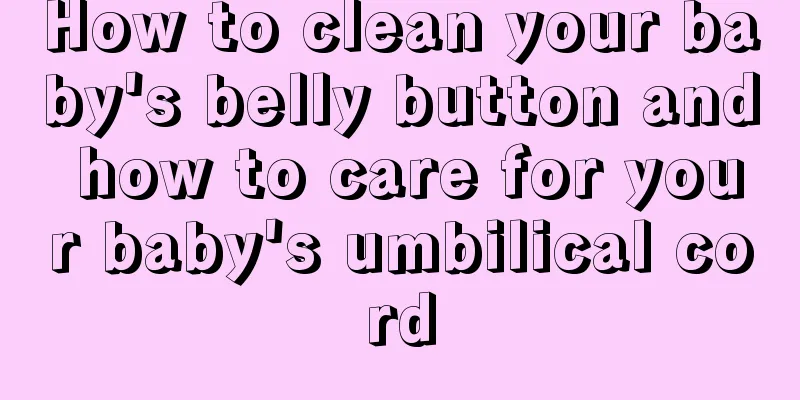How to clean your baby's belly button and how to care for your baby's umbilical cord

|
Newly born babies need their parents to take care of their belly buttons. In the mother's belly, the baby gets nutrition through the belly button. After birth, the belly button is prone to secretions. Today, I will teach you how to take care of your baby's belly button. How to care for the belly button of a newbornThere is often secretion in the umbilical fossa of a newborn baby. When the secretion dries, the umbilical fossa and the root of the umbilical cord will adhere to each other. If it is not easily cleaned, pus may appear in the umbilical fossa. Therefore, the umbilical fossa should be thoroughly cleaned. Disinfect your baby's belly button! After bathing, wipe off all the moisture on the baby's body and start disinfecting. After changing the baby's clothes, you can also expose only the belly part for disinfection. (1) Apply a few drops of medicinal alcohol onto a cotton swab. (2) Disinfect along the navel groove. (3) The upper edge, which is easily overlooked, must also be disinfected. How to care for your belly button1. When cutting the umbilical cord, the nurse will usually use a plastic clip to clamp the umbilical cord. This plastic clip needs to be removed 24 hours after the baby is born. 2. The baby's umbilical cord may swell in the first few days, like jelly, and then dry and shrink after a few days, and usually fall off completely within 2-3 weeks. During the days of delivery hospitalization, the nurse will check the condition of the baby's umbilical cord every day. 3. In order not to irritate the umbilical cord, when dressing the baby in diapers or diapers, they are generally worn below the umbilical cord. Diapers or diapers cannot cover the umbilical cord, otherwise the air will not circulate and it will easily cause infection. 4. It is best not to soak the baby's belly button in water before the umbilical cord falls off. There is still controversy about whether it is good to soak the baby's belly button in water when bathing. Some doctors believe that getting the umbilical cord wet will increase the chance of infection, while others disagree. However, regardless of whether it is okay or not, for safety reasons, it is best not to wet the umbilical cord area when bathing the baby. 5. If the baby's umbilical cord has pus, it is best not to touch water, otherwise it is easy to get infected. In this case, you can use a sponge to scrub the baby and bathe until the umbilical cord falls off and the root of the umbilical cord has healed. 6. After bathing every day, use 75% alcohol to disinfect the baby's umbilical cord. Wipe in a spiral shape from the center of the umbilical cord to the surrounding areas. Do not wipe back and forth randomly to avoid bringing bacteria on the surrounding skin into the umbilical cord. 7. Some newborn babies may have a small amount of exudate or blood due to the loosening of the umbilical cord. If the gauze covering the umbilical cord is found to be contaminated or soaked with blood, you should immediately ask the doctor to disinfect and re-tie it. 8. If the baby's umbilical cord is red, swollen, hot, or allergic, it means that it is infected and you should seek medical attention immediately. If the baby's umbilical cord is simply bleeding and the surrounding skin is normal, it may be that the clothes or quilts have rubbed the newly formed scabs, causing bleeding. At this time, you must change the baby's clothes or quilts to softer clothes or quilts. 9. After the umbilical cord of a newborn baby falls off, there will be a layer of scab at the root. After the scab falls off, there will be moisture or rice-soup-like liquid oozing out locally. At this time, parents can wipe it clean with a sterilized cotton swab dipped in 75% alcohol. 10. When the umbilical cord falls off, sometimes a few drops of blood will flow, which is normal. The dried umbilical cord will have a slight smell, which is also normal. But if the smell is very pungent and unpleasant, be careful about whether the umbilical cord is infected and tell the doctor in time. Alcohol and talcum powder are not recommended for umbilical cord careAlthough some mothers know the importance of care, their methods are always inappropriate, which results in infection in their babies. For example, if the baby's underwear is placed inside the diaper, the underwear will be soaked with urine and the navel will be in a humid environment; when changing the diaper for a boy, the penis is not pressed down, and the urine rushes upward and soaks the navel; some new mothers roll the outside of the diaper inward, and since the outer layer of the diaper is not breathable, it is not conducive to the drying of the navel; some new mothers sprinkle foreign objects such as talcum powder on the navel, etc. In fact, these are incorrect practices and are potential factors that lead to local bacterial growth and infection. There is now literature proving that using alcohol and antibiotic ointment to care for the umbilical cord will prolong the time it takes for the umbilical cord to detach. For daily care of the baby's umbilical cord, it is recommended to clean and dry it with clean water without applying disinfectants or using powders. If the umbilical cord has not fallen off naturally after 3 weeks, you should pay attention After the baby is born, the umbilical cord falls off in 5-15 days. The traditional umbilical cord care method is to disinfect the umbilical cord stump after cutting the umbilical cord once, and then gradually dry and harden until it falls off naturally. During this process, the umbilical cord secretions will increase, causing the umbilical cord to be moist, providing conditions for bacterial reproduction and increasing the chance of umbilical cord infection. Improper care can lead to neonatal omphalitis, and even more serious ones can lead to sepsis. It is very necessary to keep the umbilical cord and its surroundings clean and dry until it falls off to prevent umbilical cord infection. |
<<: Why do babies like to bite their nails? What is going on when babies bite their nails?
>>: How often should a baby take a bath?
Recommend
What material is good for milk powder box? Comparison of 4 major materials
The first type is made of glass, which is safe, h...
What should a woman who has just given birth eat? What are the taboos?
The mother who has just given birth is very weak,...
How to choose a baby stroller? What are the good brands of baby strollers?
There is one thing that every family with a baby ...
Can you still drink moldy tea? How to deal with moldy tea?
If you find that the tea leaves stored at home ar...
How to deal with children who don't do their homework? Why do children not want to do their homework?
Recently I found that my child did not do his hom...
Where is the injection for oxytocin? Will it hurt?
Generally, when the pregnancy is full, the fetus ...
Which has a higher success rate, frozen embryo or fresh embryo? What are the advantages and disadvantages of frozen embryo and fresh embryo transplantation?
We have all heard of frozen embryos. Many female ...
Do pacifiers need to be replaced regularly? Do pacifiers need to be sterilized every day?
It is recommended not to use pacifiers when the b...
What are the taboos during the confinement period? What should you eat during the confinement period?
The confinement period is a good time for women t...
What is the nutritional value of Chinese cabbage? What are the benefits of eating Chinese cabbage?
Have you ever eaten Chinese cabbage in your life?...
What are the benefits of toys for children? The significance of toys to children
Toys are an indispensable part of children's ...
How three-year-olds develop and demonstrate self-independence
When the baby grows to three years old, he begins...
How to cultivate good habits of doing housework for your baby
Although doing housework is the job of parents, t...
How to improve your baby's motor skills? What activities are there?
It is important to assist children in their multi...
How to massage the breasts to produce milk quickly How to massage the breasts to produce more milk
Some mothers are very anxious about not having en...









